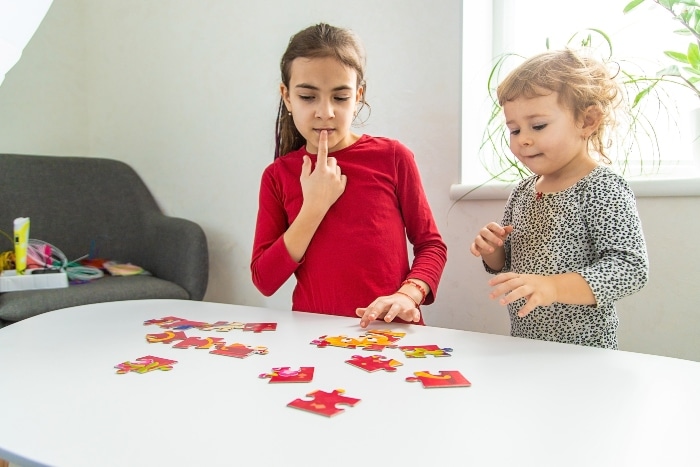Do you want to know how to teach kids proper problem-solving skills? Teaching kids proper problem-solving skills is an important life skill that can benefit them in various aspects of their lives. Here are some effective strategies to teach kids problem-solving skills:

Encourage Critical Thinking
Foster a supportive environment that encourages children to think critically and ask questions. Encourage them to explore different perspectives and consider various solutions to a problem.
Define the Problem
Teach children how to define the problem clearly and concisely. Help them identify the main issue they need to solve and separate it from any secondary concerns.
Brainstorming
Next, teach children how to brainstorm ideas and generate possible solutions. Encourage them to think creatively and come up with as many ideas as possible, without judgment or criticism.
Evaluate Options
It’s important to teach kids how to evaluate the pros and cons of each solution they brainstormed. Help them consider the feasibility, potential consequences, and effectiveness of each option.
Decision-Making
Guide children through the decision-making process. Encourage them to weigh the advantages and disadvantages of each option and choose the most appropriate solution based on their evaluation.

Break It Down
Don’t forget to teach children how to break down complex problems into smaller, more manageable parts. By dividing a problem into smaller tasks (just like you do with homework or a school project), they can approach problem-solving in a step-by-step manner, making it less overwhelming.
Trial and Error
Encourage children to embrace the concept of trial and error. Help them understand that it’s okay to make mistakes and that failure can be a valuable learning experience. Please encourage them to learn from their mistakes and adjust their approach accordingly.
Develop a Plan
Once a solution is chosen, assist children in developing a step-by-step plan of action. Break down the solution into manageable tasks, and help them identify the resources or support they might need.
Implement the Plan
Simply encourage children to put their plan into action. Support them throughout the process, providing guidance, feedback, and encouragement as needed.
Reflect and Evaluate
After implementing the plan, help children reflect on the outcome. Discuss what worked well and what could have been done differently. This reflection encourages learning and growth for future problem-solving situations.
Encourage Collaboration
Let’s not forget to teach kids the importance of teamwork and collaboration in problem-solving. Help them understand how working with others and seeking different perspectives can lead to more effective solutions.
Emphasize Persistence
Instill in children the importance of persistence and not giving up easily. Encourage them to keep trying, even when faced with obstacles or setbacks.
Provide Real-Life Examples
Use real-life scenarios or age-appropriate stories to illustrate problem-solving skills. Discuss how individuals solve problems in various contexts and encourage children to relate those examples to their own lives.
Practice Problem-Solving
Provide children with opportunities to practice problem-solving skills regularly. Present them with age-appropriate challenges and allow them to come up with solutions independently. Offer guidance and feedback as needed.
Model Problem-Solving Behavior
Be a positive role model by demonstrating practical problem-solving skills in your own life. Children often learn best by observing the behavior of adults around them.
Foster a Growth Mindset
Do teach your child that problem-solving is a skill that can be developed and improved over time. Encourage a growth mindset by emphasizing effort, perseverance, and the belief that mistakes are learning opportunities.
Celebrate Successes
Acknowledge and celebrate the successes and achievements of children when they successfully apply their problem-solving skills. This reinforces their efforts and boosts their confidence.
Remember, problem-solving skills develop over time through practice and experience. By consistently applying these strategies and providing support, you can help children develop effective problem-solving abilities that will benefit them throughout their lives.








I love, love all of these problem-solving skills. Its focus is to help children look at anything and see how it can be solved without crying or tantrums.
Such great tips to build this critical skill set in our children..
It’s so easy to give up when you are a kid. But when they see others trying harder it makes it easier to succeed.
I would do some of these for my kids when they were tiny. I would remind them that mistakes are lessons!
I will show this to my daughter. This will help with homeschooling.
These are all great strategies! I wished I was a better problem solver, especially logical things, when I was younger. Setting up your kid with a foundation of self-trust will help with all these tips.
This is so important for kids. I work in a school, and kids are so often not equipped to figure things out, and it concerns me that they do not have real-life skills.
Encouragement! Encouragement! Encouragement! I love all these tips and advice, but please continue to encourage your kids through all of it.
Your guide on nurturing kids’ problem-solving skills is fantastic! Your insights into effective teaching methods and practical examples are insightful and relatable. Your friendly tone makes it a comfortable read, and your advice is invaluable for parents and educators. Well done!
This is a really great skill that we need to teach our kids as early as possible
This is a really great and very informative post! This is really important to teach to our kids
These seem like great steps and suggestions to help children cultivate critical thinking skills!
Such great advice. I am so lucky that my parents guided me through all the decision-making process, encouraged me always and celebrated all my small & big wins to date 😍. They are the best ❤️!
I found this post to be very interesting and informative, and I really enjoyed reading it.
Thank you for sharing this amazing post. I do agree with teaching your children to think about how they are going to solve a problem or another situation.